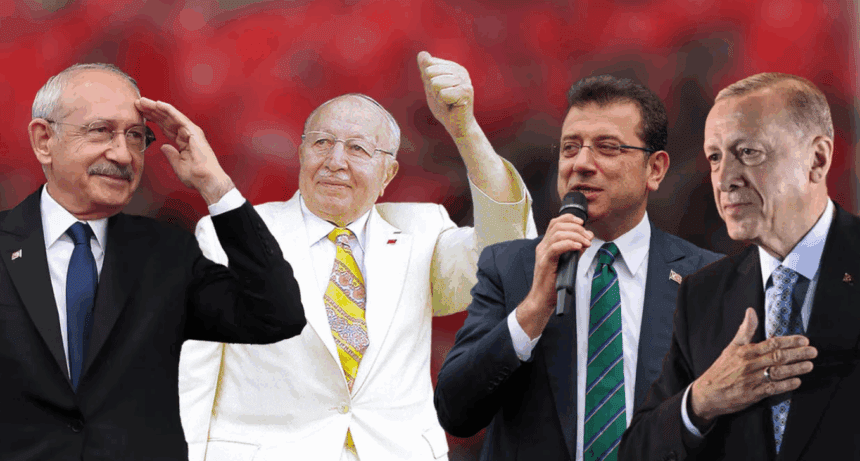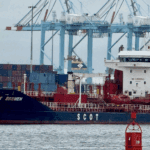In the late 1990s, Turkey’s political map was redrawn by a deep fracture within the Islamist movement. A young and ambitious Recep Tayyip Erdoğan, along with other reformists, broke ranks with Necmettin Erbakan and the rigid doctrines of Milli Görüş (National Vision). Their new party—the Justice and Development Party (AKP- (AKP- Adalet ve Kalkınma Partisi)—embraced a more flexible, pro-European, and market-friendly vision. It attracted conservatives disillusioned with old-school Islamism and centrists yearning for change. This pivot wasn’t just cosmetic—it fueled a political upheaval. The AKP’s sweeping win in the 2002 elections didn’t just launch Erdoğan’s rise; it effectively buried Turkey’s fractured center-right and birthed a new political era.
Fast forward to today, and a different but equally consequential split is brewing—this time inside the main opposition party, the CHP: A court case threatens to annul the 2023 convention results that installed Özgür Özel as party leader—potentially reinstating ex-leader Kemal Kılıçdaroğlu. After this congress, the party achieved historic success in the 2024 municipal elections—its first nationwide plurality since 1977. With a court decision expected on June 30, the 2023 congress may be annulled due to alleged procedural irregularities and vote-buying allegations. Kılıçdaroğlu has signalled his intention to reclaim the party leadership through judicial channels—arguing that refusing to comply with a court ruling could lead to the appointment of a state trustee.
From prison, Ekrem İmamoğlu has accused Kılıçdaroğlu of betrayal, warning that this power play threatens not just party unity but the broader hope for democratic renewal. “He wants to bury me in concrete,” İmamoğlu reportedly told allies, expressing deep emotional pain at being politically sidelined. His frustration echoes the reformist anguish of Erdoğan in the 1990s, when the old guard refused to yield despite a clear mandate for change.
Erdoğan and İmamoğlu: Striking Parallels
There are several political, social, and cultural similarities between Erdoğan and İmamoğlu. The parallels become even more striking when considering their shared beginnings as mayors of Istanbul, Turkey’s most influential and symbolically powerful city. Erdoğan held the position from 1994 to 1998, earning national recognition for his pragmatic and effective municipal governance. Two decades later, İmamoğlu followed a similar trajectory, serving from 2019 until his suspension in 2025. For both leaders, the Istanbul mayoralty served as a critical launching pad—providing executive experience and national visibility grounded in tangible service delivery rather than partisan ideology.
Erdoğan’s early political success was built on visible urban reforms—cleaning up the Golden Horn, lowering public transit fares, and running social aid campaigns for the needy. İmamoğlu adopted a similar playbook during his tenure as mayor of Istanbul, focusing on inclusive policies that aimed to empower youth and women while addressing the city’s long-standing urban inequalities. One of his signature initiatives was the introduction of affordable municipal dining halls (Kent Lokantaları), which offered low-cost meals to students and low-income residents throughout the city. Like Erdoğan before him, İmamoğlu emphasized practical, people-focused governance—an approach that allowed him to cultivate broad-based grassroots support and build public trust beyond partisan lines. However, when comparing their respective legacies, Erdoğan proved to be a more transformative and politically effective mayor. His tenure not only improved municipal services but also laid the groundwork for his rapid ascent to national leadership—a momentum İmamoğlu has yet to fully replicate.
Both Erdoğan and İmamoğlu share cultural and social traits that amplify their populist appeal. Hailing from the Black Sea region—Erdoğan from Rize and İmamoğlu from Trabzon—and with backgrounds as passionate amateur footballers, they have each crafted a relatable, everyman image that resonates with broad segments of the electorate. Beyond cultural familiarity, both have also strategically used religion to bolster their public personas. While Erdoğan integrates religious symbolism into his political identity, İmamoğlu employs a more subtle but deliberate engagement with faith-based communities, positioning himself as respectful of religious values without alienating secular voters. This calibrated use of religion, alongside their shared regional roots and approachable charisma, has helped both men build emotional connections with the public that transcend partisan lines.
A striking parallel lies in how legal persecution acted as a political accelerant. Erdoğan’s 1999 imprisonment for publicly reciting a poem turned him into a political martyr, catalyzing his rise to national power. İmamoğlu’s imprisonment and suspension from office in 2025, widely seen as politically motivated, triggered nationwide protests and significantly boosted his national profile. Prior to that, he was sentenced for allegedly insulting members of the election board, a charge that resulted in a political ban—now under appeal. In a further blow, his university diploma was annulled, casting uncertainty over his eligibility for public office. In addition to these developments, İmamoğlu is facing several other criminal investigations, many of which also carry the risk of political bans, reinforcing widespread concerns that legal tools are being weaponized to eliminate him from the political arena..
Yet, the context today differs: whereas Erdoğan rose at a time of growing democratic optimism shaped by European Union (EU) accession talks, press pluralism, and economic expansion, İmamoğlu faces an authoritarian political landscape with a cowed media, co-opted judiciary, and fractured opposition.. The conditions that helped Erdoğan ride a wave to power are far less favorable now.
Erdoğan Built the AKP—Could İmamoğlu Build Something New?
Necmettin Erbakan, the founder of the Milli Görüş movement, remained committed to a rigid, ideologically driven agenda rooted in political Islam. His refusal to adapt doomed his movement to irrelevance. He alienated Turkey’s reform-minded conservatives with outdated rhetoric and confrontational anti-Westernism. His confrontational approach—especially his attempts to challenge Turkey’s secular order—alarmed the entrenched Kemalist establishment, particularly the military, judiciary, and high bureaucracy. In response, the so-called “postmodern coup” of 1997 forced Erbakan from office, and shortly thereafter, his Welfare Party (Refah Partisi) was banned by the Constitutional Court. This judicial offensive was followed by the banning of its successor, the Virtue Party (Fazilet Partisi), in 2001.
These moves were not just about outlawing parties—they aimed to fragment and ultimately dissolve the rising political influence of religious conservatives. Ironically, this strategy backfired. The sustained legal and institutional pressure catalyzed a reformist break from Erbakan’s rigid ideology. A younger, pragmatic faction—led by Recep Tayyip Erdoğan, Abdullah Gül, and others—founded the Justice and Development Party (AKP) in 2001.
Yet few remember that Erdoğan himself, during that pivotal moment, expressed views that now stand in stark contrast to his current role. In a 1999 interview with Star newspaper—shortly after completing a four-month prison sentence—Erdoğan said:
“Running for office at age 65 means you’ll be finished by the time you’re 70.”
He even outlined conditions for joining or founding a new party:
“No one over the age of 65 will be allowed to engage in politics… The latest one could run as a candidate is at 65.”
Erdoğan and his allies, sensing a shift in voter priorities, embraced a more flexible vision. They positioned the AKP not just as a religiously-influenced party, but as the new face of governance, modernization, and economic dynamism. In doing so, they filled the void left by collapsing center-right parties and appealed to the broad middle of the electorate.
In other words, distancing themselves from overt Islamism, they rebranded as conservative democrats, promising EU accession, free markets, and good governance. By 2002, Erdoğan’s AKP had swept to power, capitalizing on economic crisis, political fatigue, and public frustration with the very establishment that had tried to marginalize them. Erdoğan’s ascent marked a shift in Turkish politics: conservative populism became institutionalized and dominant.
Today, in a deeply ironic twist, Erdoğan himself appears to be replicating the very tactics once used against him. Now ruling the country as a hyper-centralized, one-man regime, Erdoğan views Istanbul Mayor Ekrem İmamoğlu as the most serious threat to his grip on power. Much like Erdoğan in the early 2000s, İmamoğlu blends grassroots appeal, centrist messaging, and a reformist image that resonates across Turkey’s traditional ideological divides. His success in winning—and maintaining—support in the country’s largest and most politically significant city has positioned him as a leading contender in the post-Erdoğan era. This potential challenge comes at a time when Erdoğan appears intent on securing his legacy through dynastic succession, with growing speculation that he seeks to pass the torch to either his son, Bilal Erdoğan, or his son-in-law, Selçuk Bayraktar, in an attempt to entrench a personalized autocratic order.
Faced with this threat, Erdoğan’s regime is resorting to familiar authoritarian tools: judicial engineering and political interference. İmamoğlu is currently imprisoned on widely disputed corruption charges—accusations that many domestic and international observers view as politically motivated. Moreover, a recent legal case seeks to annul the results of the CHP’s 2023 convention, which replaced longtime party leader Kemal Kılıçdaroğlu with Özgür Özel. Should the court overturn the convention, Kılıçdaroğlu could be reinstated, fracturing the opposition and weakening İmamoğlu’s influence. While the legal action appears administrative on the surface, it bears all the hallmarks of Erdoğan’s strategy: divide the opposition, discredit its most popular figures, and exploit judicial mechanisms for political ends.
Just as the secular state once attempted to dismantle Milli Görüş through bans and fragmentation, Erdoğan is now aiming to undermine the momentum of the CHP and marginalize its strongest competitor. The parallels are striking: at that time, Erdoğan was the political underdog fighting against a repressive regime; now, he represents that very establishment, utilizing state resources to obstruct the emergence of a democratic alternative. However, this strategy could also backfire.
Just as Erdoğan’s split from Erbakan’s Welfare Party (Refah Partisi) culminated in the founding of the Justice and Development Party (AKP) in 2001, there is growing speculation that İmamoğlu might be driven to chart his own course outside the institutional confines of the CHP. Frustrated with intra-party sabotage and judicial interference—both widely believed to be orchestrated or enabled by the Erdoğan regime—İmamoğlu may ultimately be compelled to formalize his movement and vision through a new political formation.
The Missing Middle: Can İmamoğlu Fill the Void?
Ekrem İmamoğlu’s political persona stands in stark contrast to the traditional mold of the Republican People’s Party (CHP). With roots in the Black Sea heartland, a culturally conservative background, and deliberate outreach to religious communities, İmamoğlu has cultivated a cross-cutting appeal rarely seen among opposition figures. His calm, inclusive style of populism and emphasis on practical governance have allowed him to bridge Turkey’s deep social and ideological divides in ways few others have managed.
As mayor of Istanbul, İmamoğlu demonstrated a leadership model based not on rigid ideology, but on service, equity, and values-driven pragmatism. If Kılıçdaroğlu returns to power within the party and alienates key segments of the electorate, the ground may be laid for a major realignment.
Such a transformation would not represent a break from the left but rather a fusion of center-left sensibilities with moderate conservatism—reflecting the very coalition İmamoğlu has come to symbolize. Much like the AKP once captured the center ground by transcending traditional divides, a new formation led by İmamoğlu could potentially fill the vast vacuum left by the AKP’s drift into authoritarianism and the failure of Turkey’s fragmented opposition to inspire mass confidence.
Indeed, Turkey’s political landscape is marked by a glaring absence: the missing middle. Despite widespread dissatisfaction with Erdoğan’s rule, recent polling underscores a sobering reality—more voters are undecided than aligned with any political party. In a nationwide ASAL survey, 37.9% of respondents identified as undecided, outpacing support for both the ruling AKP and the opposition CHP. Many within this bloc are disillusioned conservatives and centrists who no longer identify with Erdoğan’s politics but remain wary of the traditional opposition.
What this segment of the electorate is searching for is not another ideological polemic—but competence, hope, and unity. In a freer and fairer political environment, a centrist political party built around İmamoğlu’s brand of moderate, reformist leadership could offer just that. However, such a movement would require more than personal charisma or symbolic appeal; it would demand institutional breathing room for new political entrepreneurship, free from judicial harassment and media suppression.
Erdoğan’s Shadow, İmamoğlu’s Test
As Turkey grapples with economic hardship, democratic backsliding, and deep social polarization, the appetite for a new political synthesis is growing. But transitions in Turkish politics are never linear. If İmamoğlu is to succeed where others have failed, he must do more than mirror Erdoğan’s early tactics—he must offer something Erdoğan never could: institutional healing, inclusive leadership, and a vision of modernity that transcends identity politics.
Yet the challenge is enormous. Erdoğan did not just rise because of charisma; he was buoyed by a collapsing old order, a unifying reform agenda, and favorable international winds. İmamoğlu faces the opposite: a regime with a firm grip on the judiciary, media, and state institutions; an opposition in disarray; and an electorate exhausted by decades of false promises and high-stakes power struggles.
Even so, history often moves in cycles. What seems immovable today can erode rapidly under the weight of public will. Just as Erdoğan once turned marginalization into momentum, İmamoğlu could turn persecution into purpose. But the path forward depends on more than his personal fate—it depends on whether Turkey is ready to believe in politics again, not as spectacle, but as service.
Whether İmamoğlu will become a historic bridge between eras—or yet another casualty of Erdoğan’s long dominance—remains to be seen. But one thing is increasingly undeniable: Turkey stands once again at a political crossroads. And if a new center is to rise, it will need more than a leader. It will need a movement.
By: News About Turkey (NAT)



